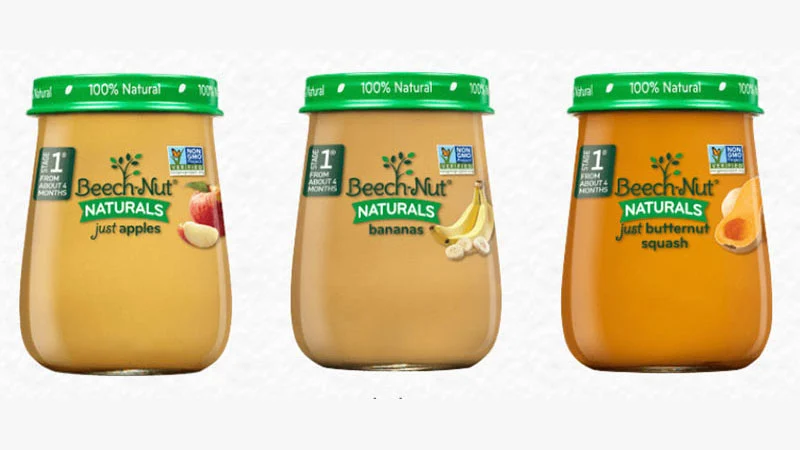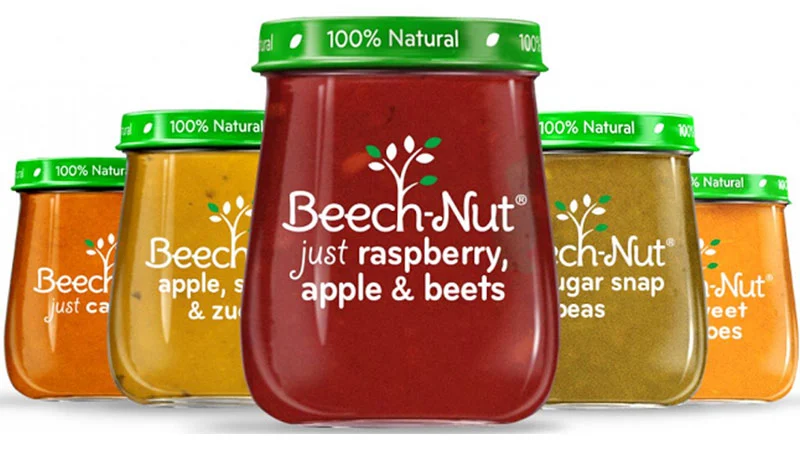Beech Nut Baby Food Lawsuit is a lawsuit involving the baby food manufacturer Beech-Nut filed by The Center for Science in the Public Interest. The federal case has been submitted to Judge Naomi Buchwald, who concluded that their products contained unsafe levels of lead and mono-sodium glutamate, also known as MSG.
As a parent, you want nothing but the best for your baby, especially when it comes to their health and nutrition. So when news broke about a lawsuit against Beech-Nut baby food, it sent shockwaves through the parenting community.

The lawsuit alleges that Beech-Nut sold baby food products containing high levels of toxic lead and arsenic that could harm infants and young children. This revelation has left many parents concerned about the safety and quality of the products they’ve been feeding their babies and wondering how this could happen.
In this blog post, we’ll examine the Beech-Nut baby food lawsuit, what it means for parents and their babies, and how we can all work together to ensure the safety of our children’s food.
What is the Beech Nut Baby Food Lawsuit?
In early 2021, Beech-Nut Nutrition Company was sued over allegations that its baby food products contained dangerous levels of toxic heavy metals. The advocacy group Healthy Babies Bright Futures filed the lawsuit, claiming that Beech-Nut’s products contained high levels of arsenic, lead, cadmium, and mercury.
According to the lawsuit, Beech-Nut’s internal testing had shown that its products contained levels of these heavy metals that exceeded federal limits. However, the company had not disclosed this information to consumers or regulators.
Beech-Nut responded to the lawsuit by stating that its products were safe and complied with all applicable laws and regulations. The company also noted that it had implemented a testing program to ensure that its products met its internal quality and safety standards.
The lawsuit is ongoing, and it remains to be seen how it will be resolved. However, it has raised concerns among parents and consumer advocates about the safety of baby food products and the need for more rigorous testing and regulation.
Which Brands of Baby Food Were Found to Contain Heavy Metals?
A 2019 report by the Subcommittee on Economic and Consumer Policy of the United States Senate Committee on Finance found that several baby food brands contain heavy metals such as arsenic, lead, cadmium, and mercury.
The report analyzed the data provided by four of the largest baby food manufacturers in the United States. The brands that were found to contain heavy metals include:
- Gerber
- Beech-Nut
- Earth’s Best Organic
- Happy Family Organics
- Parent’s Choice (Walmart brand)
- Plum Organics
- Sprout Organic Foods
- Up&Up (Target brand)
It is important to note that heavy metals in baby food are not unique to these brands, and other brands may also contain heavy metals. The report has led to calls for stricter regulations and increased transparency in the baby food industry to ensure the safety of infants and young children.
Baby food lawsuit age limit
The age limit of the plaintiff depends on how old they were when the suffering started. A person exposed to a product before their 18th birthday can file a lawsuit within ten years after their 18th birthday.
If someone was exposed to a defective product at any time during their life and suffered from using it, they can file suit at any point if it wasn’t more than ten years before they got sick with the disease caused by its exposure to the product.
Beech Nut’s Response
The company’s official statement on the issue is that it is aware of the suit but lacks any scientific evidence to support its claims.
They state, “Throughout its history, Beech-Nut has adhered to all applicable laws regarding quality and safety. The company is committed to food safety, transparency in labeling, and ethically conducting business.”
Did Beech-Nut violate any laws?
While Beech-nut might not know scientific evidence, they’re not the only ones. The FDA says there are no legal limits on lead in baby food and that the agency “has no regulations concerning lead in baby food or candy.”
However, they say: “Whether the lead is present in a particular food at a particular level is determined by various factors including how the food is prepared and processed, and what ingredients are used.
Implications for Food Safety Regulations
The Beech-Nut baby food lawsuit may have implications for food safety regulations, as it raises concerns about the quality and safety of baby food products.
The lawsuit alleges that Beech-Nut used misleading and false marketing claims to promote its baby food as natural and healthy when it contained high levels of toxic heavy metals, including arsenic, lead, cadmium, and mercury.
The lawsuit highlights the need for stricter regulations and more rigorous testing of baby food products to ensure they are safe and free from harmful contaminants. It also emphasizes the importance of transparency and accurate labeling to enable consumers to make informed product choices.
In response to the Beech-Nut lawsuit and similar concerns about baby food safety, the Food and Drug Administration (FDA) has announced plans to set new limits on the levels of heavy metals in baby food. The FDA has also guided baby food manufacturers on testing for and reducing the levels of heavy metals in their products.
Overall, the Beech-Nut baby food lawsuit underscores the need for greater food industry oversight and regulation to protect consumers’ health and safety, especially vulnerable populations such as infants and young children.

What Can Parents Do?
Parents can take several steps to help ensure the safety and quality of the baby food they give their infants. Here are some tips:
1. Choose organic baby food:
Organic baby food is grown without harmful pesticides and chemicals, which can contaminate food with heavy metals. Organic baby food is also subject to stricter regulations and testing than conventional food.
2. Check for recalls:
You can stay informed about recalls of baby food products by regularly checking the FDA’s website or signing up for recall alerts.
3. Make baby food at home:
Parents can make baby food at home using fresh, whole ingredients free from contaminants. This way, they have greater control over the quality and safety of the food they are giving their baby.
4. Be aware of high-risk foods:
Some baby foods, including rice-based products, sweet potatoes, and carrots, are more likely to contain heavy metals than others. Limiting the consumption of these foods or choosing alternatives can help reduce exposure to heavy metals.
5. Consult with a pediatrician:
Pediatricians can guide infants on the best types of baby food to give and how to introduce solid foods into their diet. They can also help identify signs of developmental delays or health issues related to heavy metal exposure.
6. Don’t ignore warning signs:
If a baby exhibits signs of developmental delays or other health issues, parents should consult with their pediatrician and contact the FDA to report any possible food contaminants.
7. Eat healthy foods yourself:
Parents should also take measures to ensure the food’s safety and encourage their family members to do the same. They can do this by choosing organic food and avoiding processed and packaged foods.
8. Spread the word:
Lastly, parents should inform other parents about food safety concerns related to baby food products so that they can be more vigilant when making purchases and feeding their children.
What Are the Dangers of Heavy Metals in Baby Food?
Many heavy metals in soil, air, and water can enter the food supply if not properly monitored. Exposure to these potentially harmful substances through ingesting contaminated food can lead to serious health problems, including developmental delays and learning disabilities.
One of the most concerning sources of heavy metals in baby food is rice-based products, which may contain high levels of arsenic, a toxic heavy metal known to cause cancer.
Lawsuits Filed Against Baby Food Companies
Yes, several lawsuits have been filed against baby food companies in recent years. These lawsuits allege that certain baby food products contain harmful heavy metals, such as arsenic, lead, cadmium, and mercury. Heavy metals can harm young children’s health, potentially causing developmental delays, cognitive issues, and other health problems.
Some of the major baby food companies facing lawsuits include Gerber, Beech-Nut, Plum Organics, and Happy Family Organics. The lawsuits allege that these companies knew or should have known about the presence of heavy metals in their products and failed to disclose this information to consumers adequately.
In response to these lawsuits, some baby food companies have taken steps to reduce the levels of heavy metals in their products. For example, Gerber has pledged to lower the levels of arsenic, lead, and cadmium in its baby food products, and Beech-Nut has stopped selling certain products that tested high for heavy metals.
Overall, the lawsuits against baby food companies highlight the importance of transparency and accountability in the food industry, particularly regarding products intended for young children.
Bottom line
Regarding food safety, parents should educate themselves about the potential dangers of heavy metals in baby food by paying close attention to recalls, checking product labels for indications of heavy metals, and choosing organic baby food with as few heavy metals as possible.
Heavy metal-free infant formula is critical for babies’ health. We don’t eat it or drink it, and honestly, we don’t want to ingest it. Infants cannot drink milk independently until they are four months old and should not be given infant formula until they are 6 months old. When babies get the formula, they must be given a high-quality formula free from heavy metals.
I hope that you found this article helpful. If you have any questions or comments, please leave them below. I’d love to hear from you!
FAQ:
Is beech nut safe for babies?
Yes, Beech-Nut baby food is generally considered safe for babies. Beech-Nut is a well-known brand that has been making baby food for over 80 years and follows strict safety standards and regulations set by the FDA. However, as with any baby food or product, it’s essential to read the label and ingredients list to ensure it’s appropriate for your baby’s age and dietary needs. It’s also a good idea to talk to your pediatrician before introducing new food to your baby’s diet.
What is heavy metal?
Heavy metal is any element or compound that does not exist or is present at deficient levels. Heavy metals include lead, mercury, arsenic, and cadmium. Many other heavy metals are commonly added to baby food as preservatives and stabilizers.
What are the health risks of heavy metals?
Heavy metals can cause damage to the brain, kidneys, and liver. They can also cause damage to the nervous system and interfere with brain development. For babies and infants, heavy metal exposure has been associated with learning disabilities and developmental delays.
What is a safe level for heavy metals in baby food?
The FDA has found no safe level of arsenic exposure for children under 6 years old. The current EPA limits for children over six years old are five micrograms of arsenic daily. No lead is considered safe at the time of this writing.
What are the health effects of heavy metals?
Heavy metals can damage the nervous system and cause brain damage or other developmental issues. They also appear harmful, causing cancer and early death in adults. Limits and regulations have been implemented to prevent children from being exposed to excessive heavy metals.
Is there a lawsuit against Gerber and Beech-Nut?
I apologize, but I am unaware of any specific lawsuit against Gerber and Beech-Nut without additional context. Gerber and Beech-Nut are both baby food companies that have been around for many years, and there may have been lawsuits involving them in the past or currently. Can you provide me with more details about the lawsuit you are referring to, such as the location, nature of the lawsuit, and any other relevant information? In that case, I may be able to provide a more accurate answer.

2 thoughts on “Beech Nut Baby Food Lawsuit: What You Need to Know?”